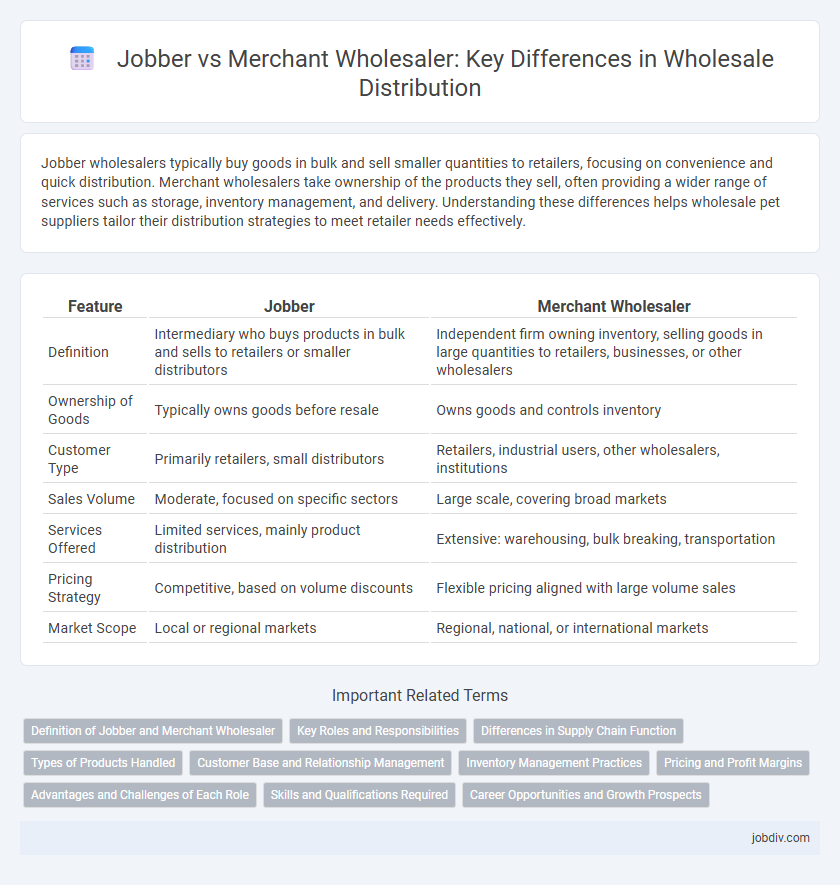Jobber wholesalers typically buy goods in bulk and sell smaller quantities to retailers, focusing on convenience and quick distribution. Merchant wholesalers take ownership of the products they sell, often providing a wider range of services such as storage, inventory management, and delivery. Understanding these differences helps wholesale pet suppliers tailor their distribution strategies to meet retailer needs effectively.
Table of Comparison
| Feature | Jobber | Merchant Wholesaler |
|---|---|---|
| Definition | Intermediary who buys products in bulk and sells to retailers or smaller distributors | Independent firm owning inventory, selling goods in large quantities to retailers, businesses, or other wholesalers |
| Ownership of Goods | Typically owns goods before resale | Owns goods and controls inventory |
| Customer Type | Primarily retailers, small distributors | Retailers, industrial users, other wholesalers, institutions |
| Sales Volume | Moderate, focused on specific sectors | Large scale, covering broad markets |
| Services Offered | Limited services, mainly product distribution | Extensive: warehousing, bulk breaking, transportation |
| Pricing Strategy | Competitive, based on volume discounts | Flexible pricing aligned with large volume sales |
| Market Scope | Local or regional markets | Regional, national, or international markets |
Definition of Jobber and Merchant Wholesaler
A jobber is an intermediary in wholesale trade who purchases goods in bulk from manufacturers and sells smaller quantities to retailers or other businesses, often specializing in specific product lines or regions. A merchant wholesaler independently owns the products it sells, taking title to goods and assuming risk, serving as a key link between manufacturers and retailers by handling inventory management, marketing, and distribution. Both jobbers and merchant wholesalers play crucial roles in supply chain efficiency by facilitating large volume transactions and reducing manufacturers' direct sales efforts.
Key Roles and Responsibilities
Jobber wholesalers specialize in purchasing goods in bulk from manufacturers to supply small retailers, offering inventory management and local distribution services. Merchant wholesalers own the products they sell, providing warehousing, risk-bearing, and sales support to various retailers and business customers. Key responsibilities for both include negotiating prices, managing supply chains, and maintaining customer relationships to ensure efficient product flow from producers to end consumers.
Differences in Supply Chain Function
Jobber operates primarily as an intermediary purchasing goods in bulk from manufacturers and selling them to retailers, emphasizing local distribution and small-scale transactions. Merchant wholesalers take ownership of the products, storing large inventories in warehouses and managing extensive logistics to supply a diverse client base across wider regions. The supply chain function of jobbers centers on rapid turnover and regional market responsiveness, whereas merchant wholesalers focus on volume handling, inventory management, and broad market coverage.
Types of Products Handled
Jobber wholesalers typically handle a diverse range of fast-moving consumer goods such as groceries, household items, and small hardware, catering to retailers with frequent, smaller orders. Merchant wholesalers specialize in bulk distribution of specific product categories like industrial equipment, electronics, or raw materials, maintaining inventory and providing extensive product support. The product focus distinguishes jobbers' convenience-driven inventories from merchant wholesalers' large-scale, often specialized, stock designed for resellers or industrial users.
Customer Base and Relationship Management
Jobber wholesalers primarily serve small retailers and local businesses, offering personalized service and flexible order quantities to maintain close customer relationships. Merchant wholesalers typically cater to larger retail chains and industrial buyers, leveraging extensive logistics networks for bulk distribution and long-term contracts. Both focus on customer retention, but jobbers emphasize tailored interactions while merchant wholesalers prioritize efficiency and scale.
Inventory Management Practices
Jobber inventory management emphasizes rapid turnover and smaller stock quantities to meet localized demand efficiently, often relying on real-time data and flexible ordering systems. Merchant wholesalers maintain larger, more diverse inventories to serve broader markets, prioritizing bulk purchasing and storage optimization to reduce costs. Advanced inventory tracking technologies, such as barcode scanning and warehouse management systems, are integral to both models but are tailored to their distinct operational scales and customer bases.
Pricing and Profit Margins
Jobber wholesalers typically operate with lower pricing and thinner profit margins due to their role as intermediaries sourcing products in bulk to resell quickly. Merchant wholesalers maintain higher pricing and profit margins by holding inventory, providing value-added services, and selling directly to retailers or businesses. The difference in pricing strategies directly impacts their gross profit, with merchant wholesalers leveraging volume discounts and customer relationships to optimize margins.
Advantages and Challenges of Each Role
Jobber wholesalers offer advantages such as flexible inventory management and faster turnaround times, enabling small retailers to access diverse products quickly, but they face challenges including limited product variety and reliance on smaller order volumes. Merchant wholesalers provide benefits like bulk purchasing power and extensive warehousing capabilities, which reduce costs per unit and support large-scale distribution, yet they encounter complexities in managing large inventories and higher operational expenses. Both roles play crucial parts in wholesale trade with jobbers excelling in agility and merchant wholesalers leveraging scale efficiency, impacting supply chain dynamics differently.
Skills and Qualifications Required
Jobber roles require strong negotiation skills, inventory management expertise, and the ability to build relationships with retailers, emphasizing quick decision-making and adaptability in dynamic markets. Merchant wholesalers demand advanced knowledge of supply chain logistics, financial acumen, and strategic planning capabilities to manage large-scale distribution efficiently. Both positions benefit from proficiency in sales techniques, market analysis, and effective communication to optimize wholesale operations.
Career Opportunities and Growth Prospects
Jobber roles in wholesale often emphasize transactional sales and inventory management, offering entry-level career opportunities with steady but limited upward mobility. Merchant wholesalers provide broader career growth prospects due to their involvement in diverse functions such as supply chain management, procurement, and strategic client relationships. Professionals aiming for advanced positions and specialized skills development typically find merchant wholesaler careers more rewarding and sustainable.
Jobber vs Merchant Wholesaler Infographic

 jobdiv.com
jobdiv.com